Every week, Kate Ellis drives the equivalent of Cape Reinga to Wellington. If cars could drive on water she'd be able to circumnavigate the globe, and then make a return roadie to Hawaii — a total of more than 50,000km — all in a working year.
The Coromandel Peninsula mum-of-two is among thousands of Kiwis who drive hundreds of kilometres, in some cases every workday, from small towns and hamlets to city jobs.
They come from north, south, east and west, sometimes sacrificing sleep, social events and downtime for higher paying jobs or better opportunities, or both, but all of those spoken to by the Weekend Herald say what they gain in lifestyle — for themselves and their children — makes it all worthwhile.
A 2017 United Kingdom study of more than 34,000 workers found lengthy travel for work was bad for health.
Start your property search
Longer commuting workers were 21 per cent more likely to be obese, 33 per cent more likely to suffer from depression, 37 per cent more likely to have financial worries and 46 per cent more likely to get less than seven hours of sleep a night.
Ellis, who goes to bed about 11pm or 11.30pm each night and then gets up at 6am, is among those not getting at least seven hours sleep.
But move from Thames to be closer to her job in the central Auckland suburb of Greenlane? No way.
Every morning from Tuesday to Saturday for the last two years Ellis has been driving 109km to her job as a team leader for Intercity Group.
After dropping her 14-year-old daughter at the school bus stop at 7.20am, the 42-year-old makes her way over the Hauraki Plains, along the high crash rate State Highway 2 and then through Auckland's southern and central suburbs on SH1.
On a good day it takes her an hour and a quarter.
On a bad day, it can take up to two-and-a-half hours.
Generally, Ellis can expect her morning commute to take about an hour and three-quarters, after which she works for eight and a half hours before driving home.
The return 109km journey is a bit quicker, but Ellis is usually not pulling into the driveway of her home until 8pm or 9pm — more than 12 hours after walking out the door.
There are days when her journey along some of the country's most clogged roads is "really frustrating", such as when it's nose to bumper from as far south as Ramarama, 35km from Greenlane.
But mostly, the hours behind the wheel are now just "part of my routine", and she has adapted her life around it.
Via her hands-free mobile, Ellis need never be bored.
"I catch up with friends, I turn up the music, I plan the day, I communicate with [colleagues]."
Her boss is understanding when an incident on the journey means she's late for work — the latest she's arrived for her 10am shift is 11.45am — but major delays are rare. And Ellis is proud to say that she's never used the long journey as an excuse to pull a sickie.
For her, living in Thames means she can live closer to nature, still be involved in volunteering as an emergency medical technician for St John Ambulance and her daughter, whose father lives nearby, has more stability.
"And when the weekends roll around, it's really just a time to relax."
She doesn't want to live in Auckland, and after doing the calculations of what renting or buying would cost, she wouldn't be financially better off. She would have to take on two or three jobs in Thames to match her Auckland pay.
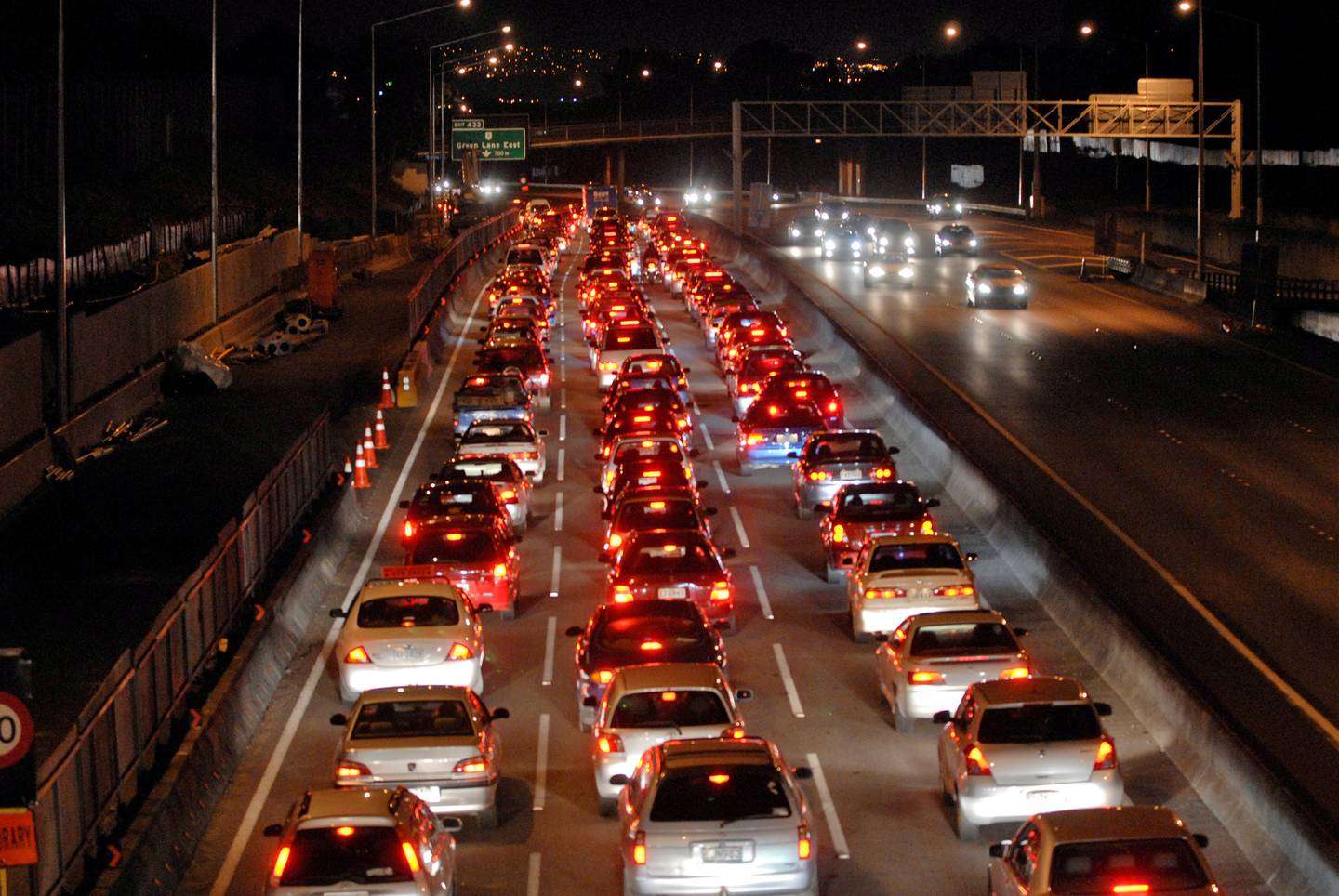
Commuting can be a nightmare, as Auckland's peak traffic shows in this file photo.
Ellis started working in Auckland in November 2016 after her hours working at the Thames Information Centre were cut, and she found herself juggling two jobs.
And while she has less time with her daughter during the week, the pair make up for it on weekends, she says.
"I prefer to do quality time, rather than quantity of time."
She hopes the challenges she faces also teaches her kids about tough choices.
"You don't go into deciding you're going to commute this distance and not have a certain goal and a certain strength — for me it's about the kids seeing that when you make a commitment you have to stick with it, and yes there will be sacrifices, but then you start reaching stepping stones towards your main goal."
CIVIC LEADERS in districts neighbouring Auckland are aware of members of their communities more frequently making the long journey to our biggest city for work.
Waikato District councillor Jan Sedgwick, based in the Whangamarino ward, knows people who leave home as early as 4am to travel to Auckland for work.
And Kaipara District deputy mayor Peter Wethey has heard of large numbers travelling from the beachside community of Mangawhai to big-city jobs.
"People say it's like an exodus leaving for Auckland at 6am, 7am."
The New Zealand Attitudes and Values Study asked adults in 2015 how many hours in the last week they spent travelling or commuting.
Unsurprisingly, those living in the Auckland region had the longest average commute time, of just under five hours.
Half spent more than five hours commuting each week and a quarter more than eight hours a week.
Wellington and Canterbury residents reported average commutes of 4.4 and 4.2 hours, while Nelson residents had the shortest average commute, at 2.2 hours a week.
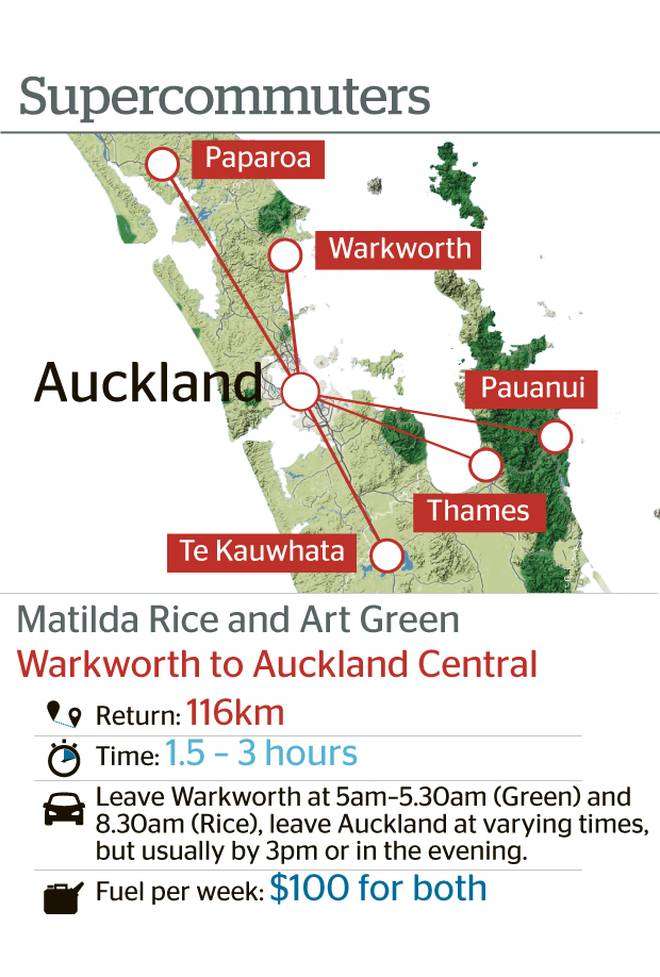
Politicians, splitting their working weeks between Parliament and their home electorate, have long cranked up the hours travelling for work, but figures show many ordinary Kiwis are also racking up the miles.
To Auckland alone, thousands are doing it.
Based on the most recent figures available, Census 2013 data about where people usually live and where they work, 8625 people were commuting to our biggest city from the Far North District down to the Matamata-Piako District.
That included 4803 from Waikato, 1521 from Hamilton and more than 500 each from the Kaipara and Whangarei districts. Smaller numbers were travelling from the Thames-Coromandel, Hauraki, Far North and Matamata-Piako districts.
The 2018 Census data will not be released until March, but the number of long-range commuters is likely to have risen alongside median house price increases which were more than 41 per cent, from $610,000 in December 2013 to $862,000 in December last year, according to REINZ.
Large-scale residential developments within commuting distances to Auckland, such as at Pokeno and Mangawhai, are also likely to have boosted numbers.
Dr Kirsty Wild, a University of Auckland research fellow in epidemiology, biostatistics and population health, discovered while researching e-bike commuting last year little research on congestion or car commuting has been done in New Zealand.
But overseas studies have shown long-distance commuting is associated with an increased risk of heart disease, diabetes, certain types of cancer, and early death.
Less time to exercise is a factor, but commuting in congested conditions, where travel times are unpredictable and motorists feel less in control, has also been found to be the most stressful way to get to work, she says.

Dr Kirsty Wild, University of Auckland research fellow epidemiology and biostatistics, and population health. Photo / Supplied
"And long-distance commuters tend to spend longer periods of time in these unpredictable, low-control commute conditions.
"Apart from the stress and lack of exercise, supercommuters tend to be less healthy because they have less time for leisure, sleep, spending time with their families, and for eating properly."
Supercommuting is particularly stressful for women, as they tend to have tighter time budgets to begin with, Wild says. "The research also shows that longer commutes have a negative effect on family life, and are associated with higher levels of partner separation."
People became long-distance commuters for a range of reasons, including lifestyle reasons, but there's no doubt Auckland house prices have pushed more into longer car commutes.
Improving housing affordability, while avoiding more commute-inducing sprawl, is key to reducing the negative health impacts of long-distance commuting, she says.
"We know from overseas research that people tend to underestimate the effect that long commutes will have on their health and family life, and that once they get started the tiredness can make it difficult for them to change their situation."
REALITY TV couple couple Art Green and Matilda Rice are among those who have moved far from the city — although still within Greater Auckland — and regularly travel back for work.
In December the couple, who met on The Bachelor NZ in 2015, bought a home together at Warkworth, 58km north of central Auckland.
Last September Rice told Next magazine the couple couldn't afford to buy a house in Auckland.
Cost is part of why they bought in Warkworth, but the town is also close to her family and "beautiful" beaches, Rice says.
"We've also been wanting to get out of the city for a while. It's a great spot and we're so happy we bought up here."
They aren't bothered by the commute to Auckland, which they make a couple of times at week at least, sometimes more.
However, Green, who hates traffic, will leave home at 5am or 5.30am so the journey south is around 45 minutes instead of the hour and a quarter later-leaving Rice faces.
Both enjoy the journey, she says.
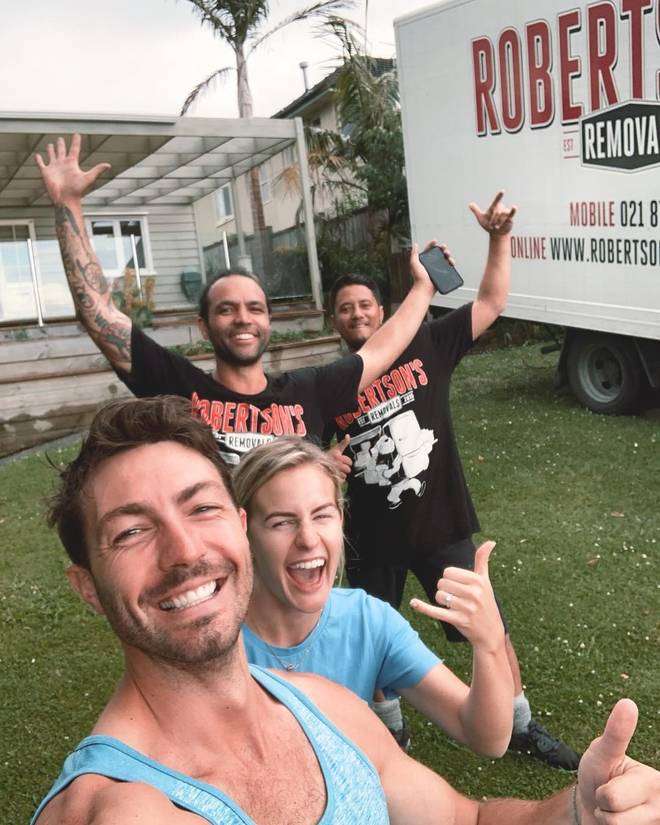
Art Green and Matilda Rice on moving day at their new Warkworth house. The high profile couple moved to the edge of Auckland in part because of rising house prices. Photo / Instagram
"I listen to podcasts, or put on music and have a good sing. It's only an issue if there's time pressure to get somewhere."
TIM SEARLE knows all about making sacrifices to have the life you want.
The grandfather-of-five has been commuting from Te Kauwhata to Manukau every weekday for 13 years and while it used to be that he got up at 5am to exercise before leaving for work 90 minutes later, he's now walking out the door at 5am.
His 60km commute takes about an hour, and he leaves at 4pm each day to avoid the worst of the traffic going home.
It wasn't about the distance, it was about the traffic — the amount of it and the behaviour of other motorists — that led him to change when his day starts making the journey more bearable. His wife is also happier he gets home earlier.
"I'd like to be able to leave at 7.15am and get to work at 8am, and then leave at 5.30pm and get home at a reasonable hour, but you just don't want to be leaving at 5pm because you'd just be right in the traffic."
There's a price to pay — he can't stay out late at night anymore. But he won't change his pre-dawn alarm.
"It's not my preference [to get up early]. But it's not my preference to spend time stuck in traffic either."
He can afford to live in Auckland. He just has "zero interest" in doing so.
"I love living in the local, rural community. We've got a nice spot here, a big section and we don't have neighbours nearby ... that's the tranquillity part."
And as for that time behind the wheel, Searle's making the best of it.
Ask the 58-year-old about the two world wars, US history, the mutiny on Royal Navy vessel the Bounty or the space programme, and Searle may well have an encyclopedic knowledge.
As other motorists listen to music, daydream, argue or simply gaze at the bumper in front of them, Searle has listened — at one-and-a-half speed — to 250 fiction and non-fiction audio books during his years of commuting.
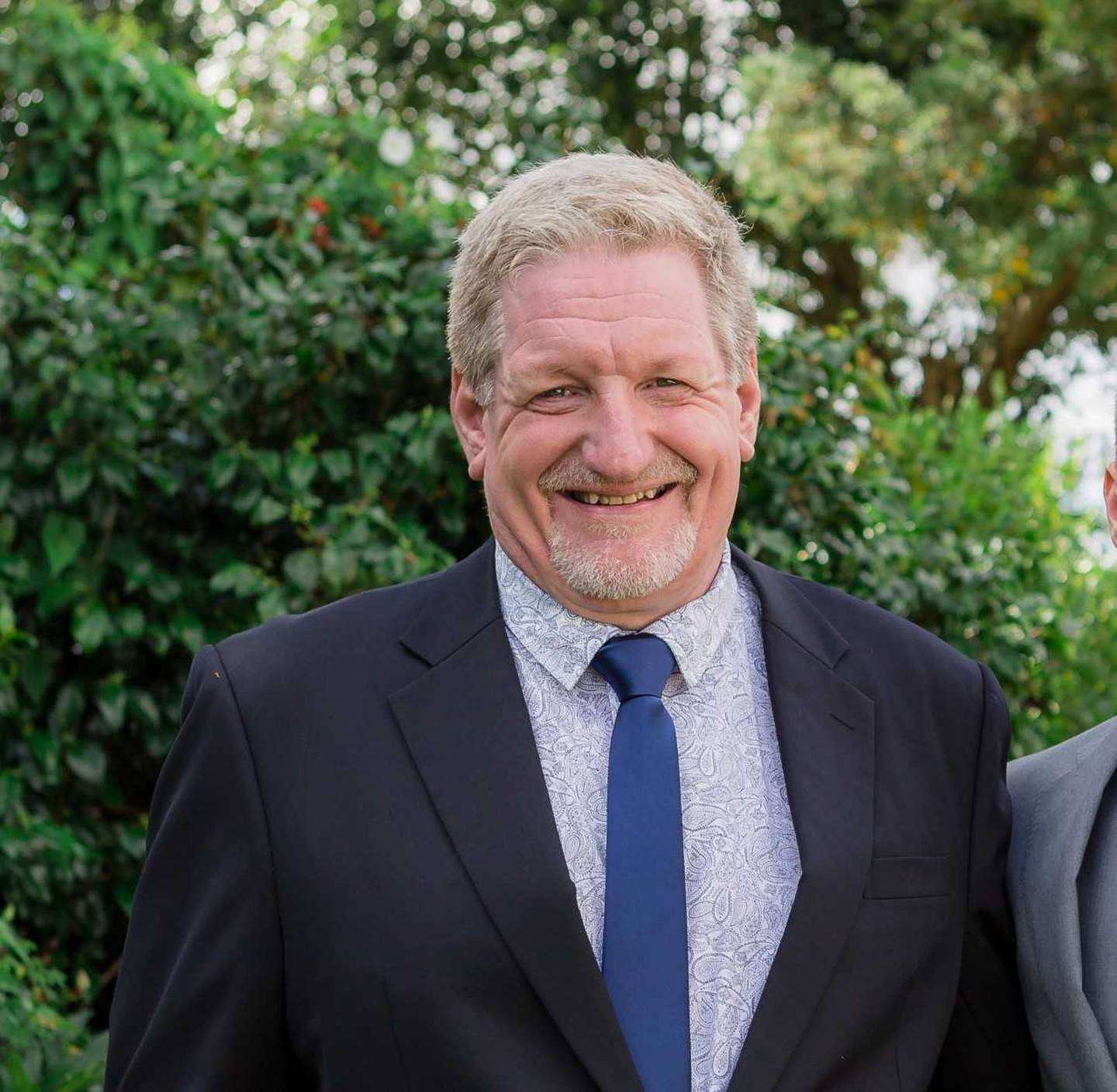
Tim Searle leaves home at 5am for his commute from Te Kauwhata to Manukau. Supplied photo / Macona Images Wellington
"I love it. It helps me relax.
"I've got more content with the drive because I'm enjoying what I'm listening to. I've always seen the commute as a time to wind up and wind down.
"When I had a short commute, I couldn't do that."
For Gayle Johnston, living between Paparoa, in the Kaipara District, and Auckland is all about planning.
She's a personal effectiveness coach for recruitment company Potentia, and every Tuesday drives 123km to the North Shore before taking a ferry to work in downtown Auckland.
Two days later, Johnston returns north, working from home.
She always leaves Paparoa late morning, and Auckland mid-afternoon, to avoid the worst of the traffic on an almost two hour commute. Her worst journey was 4.5 hours to Paparoa after a crash.
"Everything is about avoiding the traffic. And everything has to be well planned."
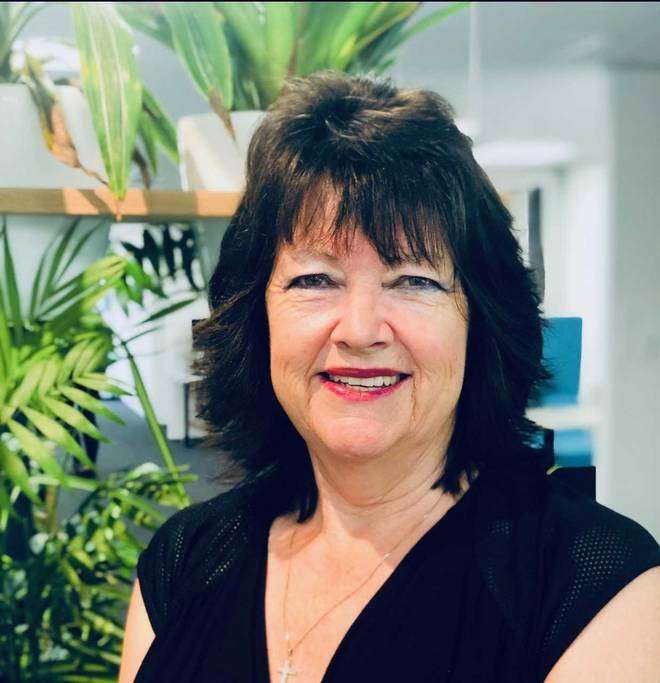
Gayle Johnston works in Auckland, but followed love to Paparoa, in Northland. Photo / Supplied
Johnston lived in Auckland before love pulled her north. Her partner of three years is a farmer and the couple bought a 184 hectare bull farm almost two years ago. And with children, grandchildren and friends still in Auckland, travelling between the two works well.
She also has a home in Auckland.
"It's living in two worlds.
"I really like that. You go where the work is and you go where your heart is."
MINDSET, ALONG with practical support and logistics, is key when you have to regularly travel long distances for work, life coach Louise Thompson says.
It's important to ask yourself, 'Why am I choosing to do this?', she says.
"When people have made peace with that answer wellbeing increases. If you are fighting the decision you have made every time you get in the car then you are going to be stressed and miserable about it."
Good sleep, exercise and socialising also helps, and are also about choice.
"In life we are always choosing one thing, in favour of another thing." Logistics are important too, as they make the commute feel like an investment, rather than a waste, of time.
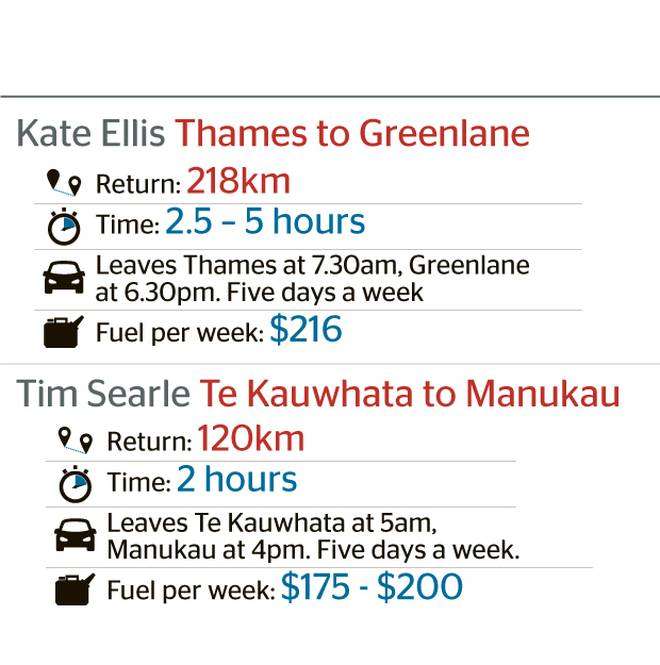
"Do you want to learn something? Relax and switch off? Connect with others? Get what you need ... audible subscription? Language school podcasts? Hands free dialling?
"The clients I see who not just make the best of commuting, but thrive on it, get their mindset and why sorted first as a fundamental — accept it, embrace it, get the logistics in place.
Cameron Bagrie says the decision to commute from outside Auckland isn't necessarily just about finances.
"There might be lifestyle aspects, family aspects to it," the managing director of Bagrie Economics says.
But when money is an issue, individual circumstances will dictate whether long distance travel to work is worthwhile, and housing costs are an obvious trigger.
"If you can get a regional house with an Auckland wage, your housing expenses look really good ... eventually housing affordability incentivises people to think about where they want to live."
But such a decision is never free. Obvious costs, such as fuel, and less obvious, such as time lost travelling can hurt, although people travelling within a congested Auckland are also vulnerable to this, he says.
Technology and low unemployment meant people no longer had to be trapped by distance.
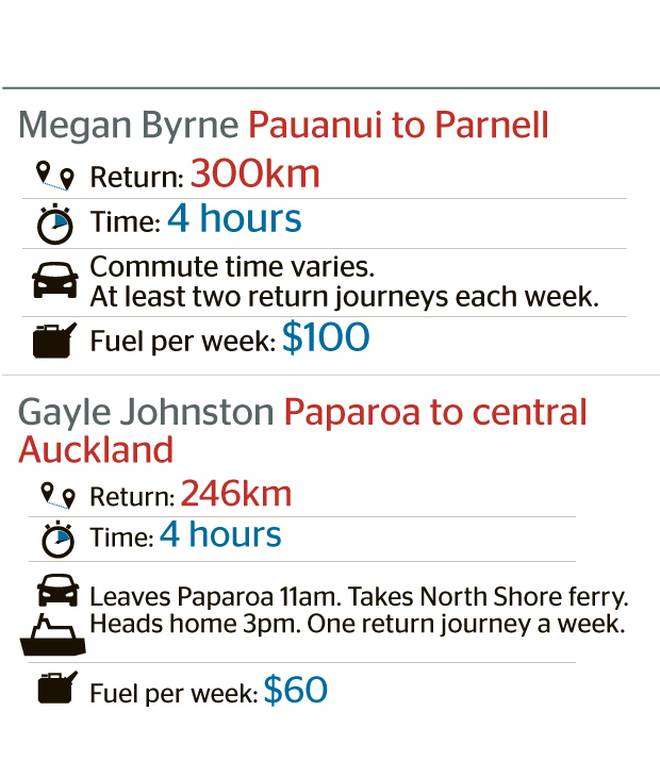
"Time is a very valuable commodity. If you think about where tech is taking us, it means distance is not such a problem, and the unemployment rate is so low employers have to be more flexible ... people can work from home, you don't have to spend five days in the office."
Of course, every person's story is different.
Their financial situation, support systems, family responsibilities and flexibility of work play a part in how they are able to cope with long hours travelling to and from work — even those travelling within Auckland.
MEGAN BYRNE travels the equivalent of Cape Reinga to Wellington every week too. The kilometres she covers every year would also take her around the globe, up to Hawaii, and back again.
Her husband, Stephen, does the same as the couple commute a couple of times a week each between their Pauanui home and the central Auckland suburb of Parnell, where they run their own tech business.
Add to that they have two teenage kids — a 17-year-old Auckland-based daughter about to start tertiary study and a 14-year-old son going to school in Whitianga — so the couple usually split their time in Auckland, catching the occasional weekday lunch together in passing, before spending the weekend together in Pauanui.
"Friday night is nice because we're all home."
There have been moments where the distance has caused headaches — their sick son calling from school when one parent is travelling and the other is almost 200km away, and a night in November when their daughter was staying alone in Auckland for the night and called, unwell, at 3am.
In the first instance, friends were able to help. In the second, Byrne drove to Auckland in an hour and 20 minutes.
And, like all the southern supercommuters spoken to by the Weekend Herald, she lamented the ongoing widening works on the Southern Motorway at Takanini.
"In 2085 when the Takanini motorway [section] is sorted it will be great.
"We could get to Auckland in an hour and a half before that, now it takes at least two hours."
Commuting is tiring, and the couple socialise less than before, but the benefits far outweigh the challenges, Byrne says.
Asked about the health effects of so much travelling, she instead talks about sleeping better because the only sound outside the bedroom window is waves breaking onto the shore, and how she is able to buy fresh, in season fruit and veges from roadside stalls.
"And fresh milk straight from the farm gate is pretty cool."
Like most other supercommuters spoken to by the Weekend Herald Auckland's housing affordability isn't the issue. Auckland is.
"There are so many benefits for us out here, otherwise we wouldn't do it, because you look at what we do [to have this life]. But here always wins."
Byrne grew up in Kaipara, and her husband on the North Shore, and they want their kids to have the same experiences they had.
"We're 30 seconds from the beach. We've got a lovely, safe community where our kids can be out till and dark and we don't worry. It's like the childhood Stephen and I had."















































































